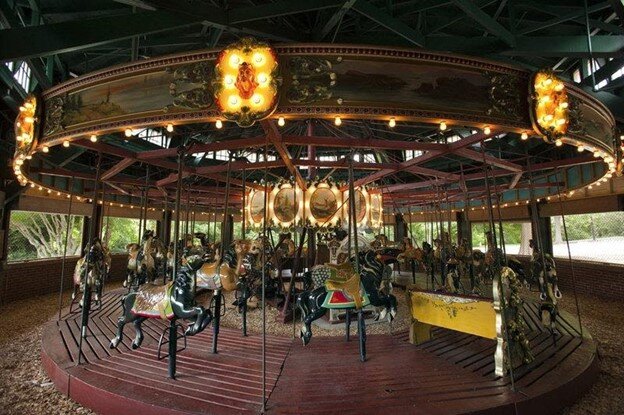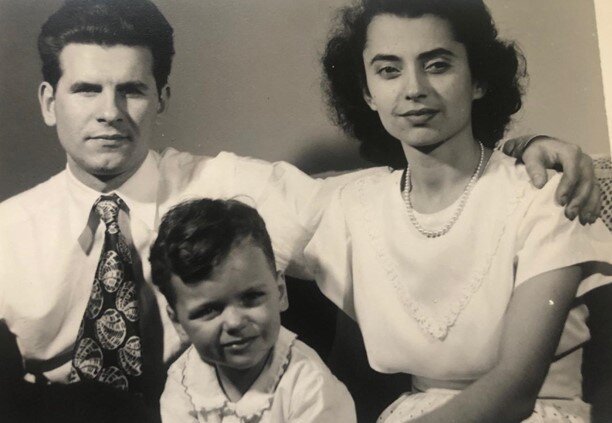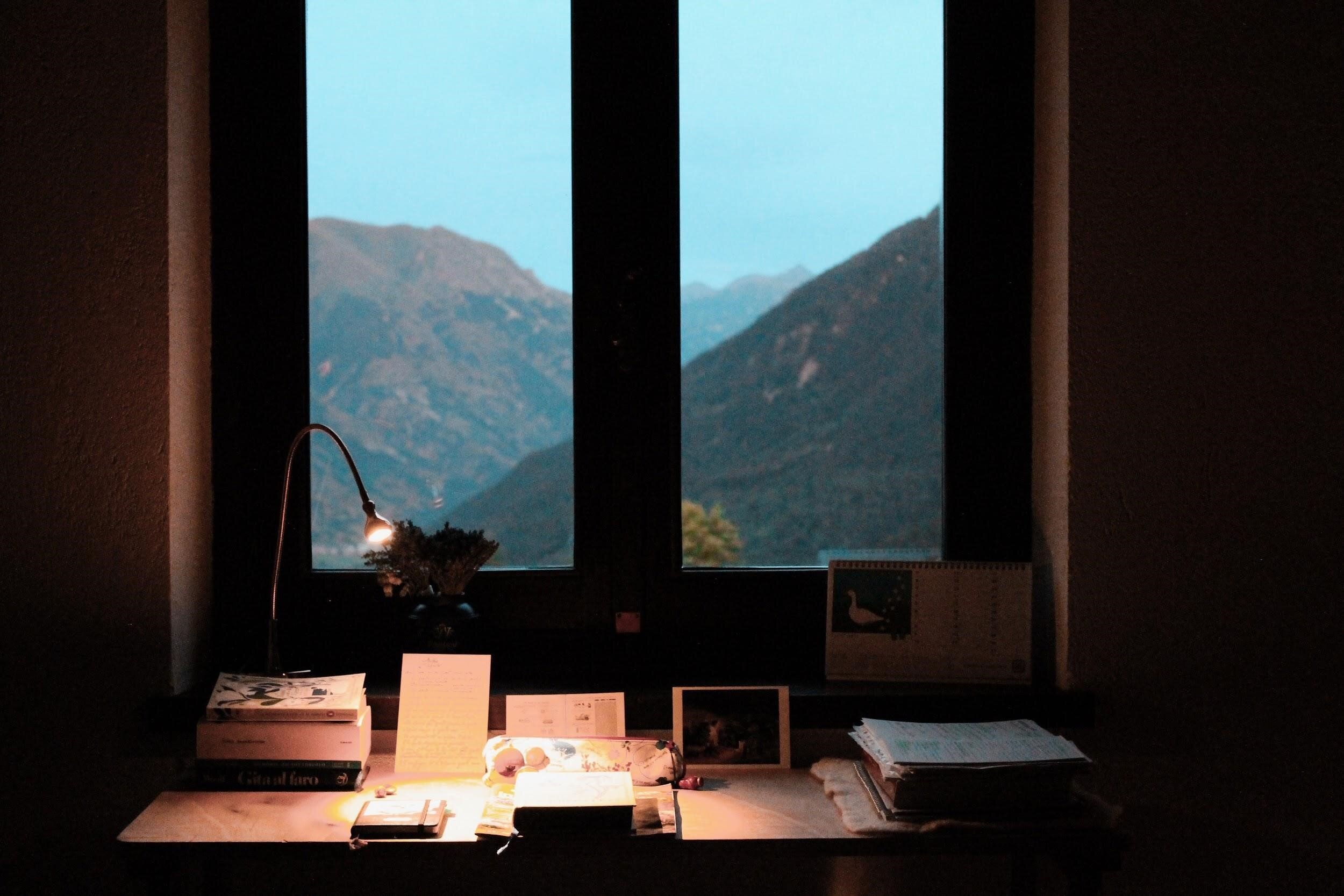Brandon Perdomo writes about testimony in relation to the body and response to social-scape by activation-of-voice in response to a presentation by both Sara Sinclair on her work on How We Go Home, and Suzanne Methot, who complements the piece with curriculum-building for Voice Of Witness.
Read MoreReach for the Moon or The Grass is Always Greener
Two thought experiments emerged in response to Leanne Betasamosake Simpson’s presentation at OHMA on November 12, 2020. They take the form of a diptych collage titled “Reach for the Moon or The Grass is Always Greener”.
Read MoreBuilding Beyond Convention: Strategies for Processing Liberatory Creative Practices
With a small group of co-moderators, a cohort of OHMA Students participating in the Workshop course had the opportunity to host a seminar with Dr. Leanne Betasamosake Simpson. For three and a half years I’d been poring over her book As We Have Always Done: Indiginous Freedom Through Radical Resistance, and I was finally meeting her in person—well via Zoom. As a student of economics, I had always wanted to ask about integrating politics of decolonization, radical resistance, and black-feminist politics into disciplines like economics or STEM. The following is a meditation on the wisdom that Dr. Simpson shared in our seminar, and the personal strategies I have been cultivating based on that dialogue.
Read MorePreservation as Violence: The problem facing museum collections
Leanne Betasamosake Simpson presents an ethical framework around consent that challenges the way museums currently handle material culture. Oral history presents one way to navigate these challenges and to preserve the relationship between object and community.
Read More“That was going to be the family home and be there forever”
The Chavis Carousel is the centerpiece of the 37-acre park in the Raleigh, North Carolina neighborhood, Chavis. When the park opened in 1938, it was the only African American park in the Southeast United States. Because of this, it was visited by many African Americans throughout North Carolina as well as other states. Following the end of segregation the park and surrounding neighborhoods began to decline under various influences. The City pledged re-investment in the park ten years ago and is just now beginning to fulfill that promise.
Read MoreA Heroine’s Journey Through History
A photo I recently took at a Detroit railroad underpass on Trumbull St. A colorful mural of “Black Lives Matter” painted into the geometric design on a division between the road and nature.
After navigating Sarita Daftary-Steel’s East New York Oral History (ENYOH) Project, a current MFA dramaturgy student, Kate Foster, reflects on her journey to uncover and understand her family’s history in Detroit, MI. She remarks on the benefits of agency in learning history and discovers connections between the ENYOH Project and the elements of a documentary play.
Read MoreReflections on East New York
This personal timeline essay is inspired by the East New York Oral History Project’s interactive timeline, which allows visitors to learn about the historical and political contexts of racial segregation on local, regional and national levels. Although the project’s timeline is on a grand scale, it caused me to reflect on my tenuous personal experiences in East New York, and sent me on a journey to learn more about my family history in the neighborhood.
Read MoreBeyond and Before the Curtain: Oral History Theatre of Toronto Chinatown Women
Women of different ages, colors, and roles - in a circle, weaving the glittering web for a night sky. This artwork piece is inspired by a song to make a beautiful metaphor communicating how powerful women are, in constructing the world. (Photo: Molly Costello Art & Design)
What does an actor/actress look like when off-stage in the real world? The human drama goes on beyond the curtain fall. In this piece, OHMA student Yiling (Nina) Zhou draws from an interview she conducted studying the history of Cantonese Opera in Canada and reflects on her oral history project. This approach was inspired by the recent OHMA workshop with Nikki Yeboah, whose oral history performance project, “The (M)others, explores the stories of four women who lost their loved ones to police brutality. Her process of theatre-making shows an empowering way in storytelling of women.
Read MoreAnnouncing the 2020 Jeffrey H. Brodsky Oral History Award Winner and Runner Up!
In November of 2015, Jeffrey H. Brodsky, OHMA alum, announced a generous cash prize of $3000 for an outstanding capstone/thesis. The criteria for receiving the award is that the capstone/thesis must “make an important contribution to knowledge and exemplify the rigor, creativity and ethical integrity we teach our students.”
Read MoreSummer Workshop Series on Anti-Oppression and Oral History
In this series, we will share visions for oral history in which people of color - their knowledge, skills, practices and voices - are at the center of our practice.
Read MoreOpportunities to Work with Oral History MA Students 2022-2023
OHMA is excited to let you know about opportunities available this year to work with Columbia's Oral History MA Program students and invite you to participate in our fieldwork partners and internship programs. This year we expect that much if not all of our interviewing and internship work will be done remotely, which creates new opportunities for collaboration across physical distance, and we welcome proposals from any location.
Read MoreOral History, Indigenous Oral Histories, and Decolonization
Explore the work of students and alumni who have been using their work to amplify Black voices, end mass incarceration, and challenge white supremacy.
Read MoreIn Solidarity: A Statement from OHMA
The racist killings of Ahmaud Arbery, George Floyd, Breonna Taylor and now Rayshard Brooks, coming on top of 400 years of oppression and state-sanctioned violence against Black people in North America, fill us with grief and rage. While the historic uprising of the past weeks has been inspiring, exciting, and challenging, we know, and we are reminded, that the work of dismantling white supremacy is hard and it will be long. As we support and join with New York and global protests that challenge policing and systemic racism, we know there is also work for us to do from within a predominantly white, elite institution. I know this personally as a white person in a position of leadership.
Every fall I teach a class on doing oral history from an anti-oppression perspective to our new cohort. We talk about how this work has to happen both in our practices as oral historians, and in our work to develop the field of oral history. We talk about how, in our interviews, we have to ask white people about race, and not bolster the assumption of whiteness as a neutral identity. We talk about how it is not enough for our institutions to “welcome diversity” – we need to change so that we are no longer white institutions that welcome in people of color, but are truly led by people of color in ways that transform our work. All of this talk is important – as oral historians we know that listening and speaking can be transformative - and we do some work to back it up, but we see this moment as an opportunity to do more.
In the past few weeks I have been pondering how OHMA can deepen our work to challenge structural oppression, and white supremacy and anti-Black racism in particular. I asked myself, and our community, “What do we have, and what can we do?” With the support of our faculty and staff, I am sharing the following plans and thoughts:
We have authority, as one of the oldest and largest oral history programs in the world, and as an Ivy League institution. We recognize that privilege, even as we seek to undermine it. We can use that authority to challenge what counts as oral history, to lift up the voices of Black, Indigenous, and people of color (BIPOC) oral historians. In our syllabi and in our public programming, we commit to continuing and intensifying our work to center the ideas, practices and writing of Black, people of color, and Indigenous oral historians.
The majority of our students, the speakers in our Thursday evening public programming series and the instructors in our Saturday workshops are BIPOC. We direct most of our financial aid to BIPOC students. This is intentional, and we pledge to continue it.
Some of our syllabi, including mine, too much reflect the overall predominance of white voices in the oral history literature. We can and will do better. Over the summer, we will be working to center the knowledge of BIPOC more in our syllabi.
We have a space to think. The training, experiences and identities of the people facilitating those spaces in our classrooms will shape the conversations we have.
Our faculty has not represented the diversity of our world, or of our student body. We have to do better. For the 2020-21 academic year we are thrilled to welcome Sara Sinclair and Zaheer Ali to our faculty. Sara will be teaching Indigenous Oral Traditions and Anti-colonial Oral Histories and Zaheer will be teaching Listening After the Interview: Oral History as Archive & Historical Method.
As a team, our faculty and staff will be participating in an anti-oppression training this summer, with a particular focus on understanding and fighting anti-Black racism. We will work as a group to develop shared strategies across our classes so that our incredibly diverse students can learn from and with each other. We must be able to vigorously challenge each other and open ourselves to receiving such challenges while also not allowing microaggressions and other expressions of white supremacy and structural oppression in our classes.
We are teachers. It has been an extraordinary experience for us during this pandemic to take our public training workshops online, and see the large global audiences we have been able to serve and connect with.
This summer, we will be offering a free, public training series sharing a range of decolonized and anti-oppression approaches to doing oral history work. Donations will be welcomed, and anything we raise beyond the cost of paying the instructors will go to a grant for an incoming Black student. Stay tuned for registration info for these later this month.
We have a community. On our student and alumni listserv some of us have been sharing how we are contributing to the work of challenging white supremacy, from protesting in the streets to organizing in our communities to having difficult conversations with family members. This has been inspiring.
For many in the OHMA community, the work of dismantling structural oppression and decolonizing our world has been and will continue to be central to our work. We invite you to check out some of these projects.
As a program, we commit to supporting spaces for Black, Indigenous and people of color staff, students and faculty to convene and build community amongst themselves, in whatever configurations and for whatever purposes they find most useful. As a leader, I welcome and commit to listening carefully to any ideas, requests, and critiques that come out of these spaces. We also commit to an expectation that white students also take responsibility for this shared work
As oral historians, our work is to listen. We understand that dialogue itself can be a site where power is grappled with and contested. As educators, we create supportive spaces where we can all be challenged to take risks, to grow, and to change. We pledge to use these skills and our resources to engage actively in the long, hard, essential work of undoing white supremacy and colonialism, and challenging all forms of structural oppression.
Black Lives Matter!
In solidarity,
Amy Starecheski
Oral History Projects that Challenge White Supremacy
Explore the work of students and alumni who have been using their work to amplify Black voices, end mass incarceration, and challenge white supremacy.
Read MoreListening in Space
NPR host Diane Rehm and her son David conduct an interview in the StoryCorps MobileBooth. The space is lined in wood paneling and has low lighting focused on the table where the speakers sit. Two microphones are in the center of the table pointed at Diane and David who sit across from each other in padded booths. Diane has white shoulder-length hair, is wearing a beige cardigan and is smiling at David. David is bald with a short white beard, glasses, and is in a dark suit. Both have light skin. Photo by Shawn Miller from the Library of Congress.
There are many factors at play during an interview, affecting both the questions being asked and the stories being told. In this blog post, current OHMA student Lauren Instenes analyses the impact of one of the less talked about factors, space.
Read MoreJourneys Through Spaces: Spoken, Written, Physical and Virtual
In this blogpost, inspired by Carlin Zia’s March 5th OHMA presentation on her book “Uncertain Journeys,” Lisa R. Cohen reflects on the fluid nature of shared memories in different spaces - traveling back and forth between spoken, written, physical and even, increasingly, the virtual world.
Read MoreHug Your Plant! and Other Self-Care Tips for Oral Historians in Lockdown
A desk in front of a window. It’s sunset. The window looks out onto mountains. On the desk there are books, notebooks, postcards and a pencil case.
Photo Credit: Eleonora Anedda
Ted Kerr’s wise words inspired OHMA student Eleonora Anedda to reflect on the responsibilities of oral historians in times of crisis. Not so much on their duty towards others, but their obligations towards themselves. This piece will examine much needed self care habits that can be incorporated in our lockdown routines.
Read MoreUncovering Thyself: Identity Politics & Oral History
In this blog post, current OHMA student Marina Labarthe del Solar shares a conversation with Theodore Kerr about the importance of being transparent about your identity and positionality with the communities you work with. Marina writes about identity politics and how knowing where you stand with respect to power is an essential skill for oral historians.
Read MoreDialogue with Institutionalized Residents: Examples and Advice
Mt. Fuji in distance
(Photo: Sach Takayasu)
How do you engage in a dialogue with a narrator who lives permanently in an institution? Let me tell you a story.
Read MoreAI: An opportunity to reimagine an old-world anew
A black earbud case sits on a smartphone.
Photo by SCREEN POST on Unsplash
In this piece, Francine D. Spang-Willis reimagines a relationship with oral history and technology to create artificial intelligence that is more representative of and responsive to maintaining and perpetuating Indigenous language, knowledge, and culture. The piece is inspired by Stephanie Dinkins' Oral History as Told by AI presentation given on April 2, 2020.
Read More
![[ - a grid displays images of a body in motion - ]](https://images.squarespace-cdn.com/content/v1/50d0a18de4b07abde41656e7/1608597314431-Z7O2YLKJOYXLQZNPS0PE/Brandon.jpg)














